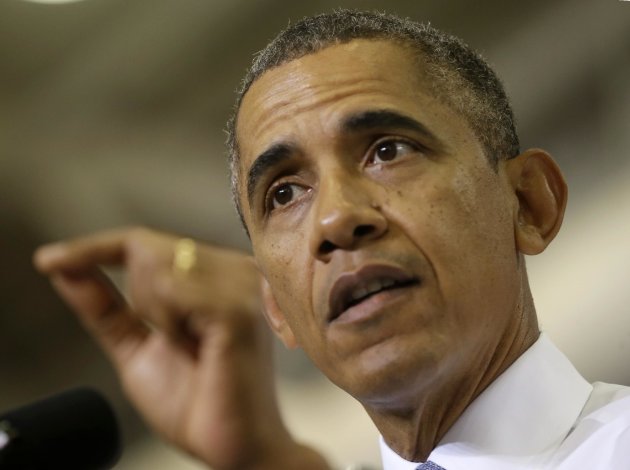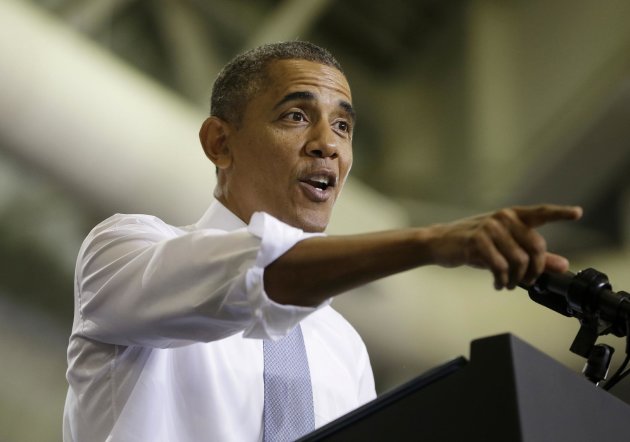Obama's no-negotiation stance setting new tone
 By |
By | Friday, Sep 27, 2013
Associated Press – 5 hrs ago

Associated Press/Pablo Martinez Monsivais -
President Barack Obama speaks about the Affordable Care Act, Thursday, Sept. 26,
2013, at Prince George's Community College in Largo, Md. The president is
promoting
WASHINGTON (AP) — This time, President Barack Obama says, he's not
budging. This is the confrontational Obama, the "Make my day" president, betting
Republicans blink to avoid a
government shutdown or a
first-ever default of the nation's debts.
It's a proposition not without risk and one with a history of last-minute
accommodations on both sides. Brinkmanship between Obama and congressional Republicans has
often stopped at the precipice's edge.In this round, however, the president and his aides maintain that when it comes to raising the government's borrowing authority and meeting its debt obligations, there's no bargaining.
"The entire world looks to us to make sure that the world economy is stable. You don't mess with that," Obama said Thursday. "And that's why I will not negotiate on anything when it comes to the full faith and credit of the United States of America."
Still, House Speaker John Boehner says a debt hike must be linked to budget cuts and other programmatic changes.
"The president says, 'I'm not going to negotiate,'" Boehner said. "Well, I'm sorry, but it just doesn't work that way."
Obama's stance is rooted in experience, politics and a desire to protect himself from similar demands in the remaining three years of his presidency.
Obama advisers note that past negotiations have not yielded grand bargains and that the mere threat of default in 2011 rattled the economy, causing a downgrade in U.S. credit. Talks earlier this year to avoid automatic spending cuts known as sequestration also failed.
Obama aides also note that Boehner himself eight months ago declared an end to negotiations with Obama, favoring the regular legislative process instead.
That process has proved messy for the GOP and senior White House aides insist that in a standoff, Republicans will be perceived as the unreasonable party. And the White House is convinced any concession would place the president in the position of having to bargain again and again when the next debt ceiling looms.
"Every poll I've seen suggests that while no one escapes cleanly from a shutdown, the GOP would bear the brunt," former senior White House counselor and Obama adviser David Axelrod said. "The bigger danger for the president is to put himself in a position to be constantly held hostage. First they want an arm. Then they want a leg. It's unsustainable."
The likelihood of a shutdown Oct. 1 and the threat of a credit default in the ensuing weeks have mounted as conservative Republicans push to use a stopgap spending bill and an increase in the debt ceiling as leverage against Obama's 3-year-old health care law.
House Republican leaders, meanwhile, want to attach other provisions to the debt ceiling, including approval of the Keystone XL pipeline and provisions blocking pollution regulations.
Senate Majority Leader Harry Reid, D-Nev., on Thursday demanded the GOP-controlled House simply send the Senate unencumbered spending and debt ceiling bills.
"There's no need for conversations," Reid said. "We've spoken loudly and clearly, and we have the support of the president of the United States. And that's pretty good."
The Pew Research Center, however, found nearly 6 out of 10 Americans want politicians they side with to be more willing to engage in talks. And the public split about evenly in the Pew poll on who would be responsible if the government shut down, with 39 percent blaming Republicans and 36 percent Obama and much of the rest blaming both.
"The president may not be playing this just for this set and this match," said Patrick Griffin, the White House legislative director under President Bill Clinton. "As his tenure goes on and his legacy looms larger, he might not be as poll sensitive as he might be otherwise."
White House aides say Obama is still willing to negotiate over a long-term spending deal, just not as part of raising the debt ceiling. But the opportunity for that could be short-lived, too. The Senate version of the short-term spending bill would set up another possible government shutdown as soon as Nov. 16.
What's more, lines in the sand have blurred before.
Obama ran for re-election vowing to increase taxes on individuals making more than $200,000. Republicans insisted they would not raise taxes at all. In the end, both settled on a hike on incomes above $400,000. Most recently, Obama altered course on Syria, at first determined to launch missile strikes against its regime, then seeking congressional support before taking a diplomatic path aimed at destroying Syria's chemical stockpile.
The White House also sees the current showdown as an opportunity to cast the Republican Party in the image of Sen. Ted Cruz of Texas, a leader in the effort to kill Obama's health care law.
"They have allowed Ted Cruz to be their face, write their charter, and steer their ship," said senior White House adviser Dan Pfeiffer. "That is a decision that has real consequences for how the American people view the Republican Party as we head into this debate."
Still, if the White House is eager to stitch Cruz' name to the Republican Party banner, many Senate Republicans were doing their best to distance themselves from the Texan and his aggressive tactics.
Indeed, as much as Republicans dislike the health care law, many Republicans argue that seeking to kill it is fruitless as long as Obama is president and Democrats control the Senate.
___
Follow Jim Kuhnhenn on Twitter: http://twitter.com/jkuhnhenn
Obama mocks GOP for 'crazy' Obamacare predictions
 By |
By | Friday, Sep 27, 2013
Associated Press – 18 hrs ago

Associated Press/Pablo Martinez Monsivais -
President Barack Obama speaks about the Affordable Care Act, Thursday, Sept. 26,
2013, at Prince George's Community College in Largo, Md. The president is
promoting
White House shoots down idea of device tax repeal in funding bill
Friday, Sep 27, 2013Reuters – 18 hrs ago
WASHINGTON (Reuters) - The White House would not agree to repealing a medical device tax as part of a
stop-gap bill to continue funding the government past September 30, White House
spokesman Jay Carney said on
Thursday.
The tax helps to fund President Barack Obama's 2010 healthcare law and Republicans are trying to undermine the law.
The White House also would reject the inclusion of a measure to approve TransCanada's Keystone XL oil pipeline on a bill to raise the debt limit, Carney told reporters at a briefing.
(Reporting by Roberta Rampton, Mark Felsenthal; Editing by Sandra Maler)
Health care exchanges open Tuesday: What you need to know
On Tuesday, the health insurance exchanges that are a cornerstone of
President Barack Obama’s
Affordable Care Act will open for the first time, and the White House expects 7 million
uninsured people to sign up during the six-month enrollment period.
But don’t fret if you have no idea what these exchanges are — you are not alone. In August, 45 percent of people polled by Kaiser said they had heard “nothing at all” about the health insurance marketplaces mandated by the law.
Here’s a guide to the exchanges:
What is the health insurance exchange?
The health insurance exchange, or marketplace, will allow people who don’t have coverage through Medicaid, Medicare or their employer to comparison-shop for the best individual plan in their state on HealthCare.gov. In 34 states, the exchanges are managed entirely or mostly by the federal government; the other 16 states have set up their own exchanges.
About 95 percent of uninsured people will have a choice between at least two insurers offering an average of 53 different plans, according to the White House.
The plans are divided into four categories: bronze, silver, gold and platinum. A bronze plan — the cheapest — covers 60 percent of an individual’s estimated health care costs, while the platinum plan will cover 90 percent of costs. (Some states also offer catastrophic plans that cover even less than 60 percent of costs.)
Starting in 2014, insurers cannot charge customers more based on their pre-existing conditions or their medical history, and all plans must offer a minimum of services, such as maternity care, that some plans did not offer in the past.
Do I have to buy health insurance on the exchange?
If you’re uninsured, you have to purchase health insurance or face a fine of $95 or 1 percent of your income, whichever is larger, on your 2014 tax return. (That fee will go up to 2.5 percent of income in 2016.) Consumers making up to four times the federal poverty level will qualify for tax breaks when they purchase the insurance, to offset the cost. If purchasing insurance would cost more than 8 percent of your income, including the tax break, you’re exempt from the fee.
How much will it cost?
The costs for insurance will vary widely by state, and even by county. The White House estimates that the average monthly premium for a low-cost silver plan will be $328 a month for an individual, before tax credits are applied. A family of four with an income of $50,000 before taxes could pay as little as $205 a month for insurance in Alaska, after the tax credit is applied, and as much as $282 in North Carolina and several other states. (Before the tax credit is applied, the price for the family varies from $584 per month in Arizona to $1,237 in Wyoming.)
With tax credits and including the Medicaid expansion, nearly six out of 10 uninsured people will have access to a health plan that costs under $100 per month for next year. You can peruse the White House’s premium cost estimates by state on its site, but be aware the figures cited are averages for the entire state and might be different based on which county you live in.
How do people enroll?
In order to process millions of applications, the Obama administration built a website called HealthCare.gov where applicants can comparison-shop for insurance offered in their state.
Users log in and create an account and are then asked a series of questions about their income, family size, employer name and contact information. The site connects to other federal agencies’ databases to verify the information provided, and it then informs the user if he qualifies for Medicaid or the Children’s Health Insurance Program. If not, the user is then directed to the marketplace, where he can compare different plans and see exactly what tax break he qualifies for and how much the insurance would cost per month. If you decide to purchase the insurance, you’re led to the website of the insurer to finish the transaction.
There’s also a 24-hour hot line people can call if they have any questions while navigating the application process, which can assist them in 150 languages. The Obama administration also doled out millions of dollars in grants to train “navigators” who work in community health centers and other locations to enroll people in person.
Uninsured people will have six months to enroll starting Oct. 1, but must enroll before Dec. 15 if they want the insurance plan to kick in on Jan. 1.
Can the insurance prices change?
The insurance price quoted on the health care site is locked in for 2014 and can’t change. Next year, the insurer could change the price, but consumers also will have the option to shop around again and switch plans.
Will the enrollment website work?
The Wall Street Journal reported last week that the computer system was not accurately calculating the costs of the insurance plans. But David Simas, White House deputy senior adviser for communications and strategy, says these bugs are being ironed out and that the exchanges will be ready to go on Oct. 1.
WASHINGTON (AFP) - President Barack Obama on Saturday urged the US Congress to approve a budget to
keep the government open after October 1, and raise the debt ceiling so the
country can pay its bills.Far-right Republicans in Congress want to take neither
action in their attempt to defund a sweeping health care overhaul approved more
than three years ago. Critics nicknamed the law "Obamacare," and Republicans
have fought to repeal it since its passage.If a budget "doesn't pass before
September 30th - a week from Monday - the government will shut down," Obama said
in his weekly Saturday morning broadcast address. "And so will many services the
American people expect."Obama warned that even soldiers serving abroad could see
their paychecks stopped.Congress must also raise the limit on government
borrowing, as the US government is expected to run out of money by around the
middle of October -- a scenario that could make stock markets tumble and send
shockwaves through the global economy."Since the 1950s, Congress has always
passed it, and every president has signed it - Democrats and Republicans," including conservative icon
Ronald Reagan, Obama said."And if this Congress doesn't do it within the next
few weeks, the United States will default on its obligations and put our entire
economy at risk."While Democrats and "some reasonable Republicans" are willing
to take both actions,"there's also a faction on the far right of the Republican
party who've convinced their leadership to threaten a government shutdown" and are
"willing to plunge America into default" if they can't defund the health care
program."The United States of America is not a deadbeat nation," Obama said. "We
are the world's bedrock investment. And doing anything to threaten that is the
height of irresponsibility."That's why I will not negotiate over the full faith
and credit of the United States. I will not allow anyone to harm this country's
reputation, or threaten to inflict economic pain on millions of our own people,
just to make an ideological point."Many federal agencies and programs will
shutter on October 1, day one of the coming fiscal year, if Congress and the
president do not agree on a temporary budget measure.


No comments:
Post a Comment